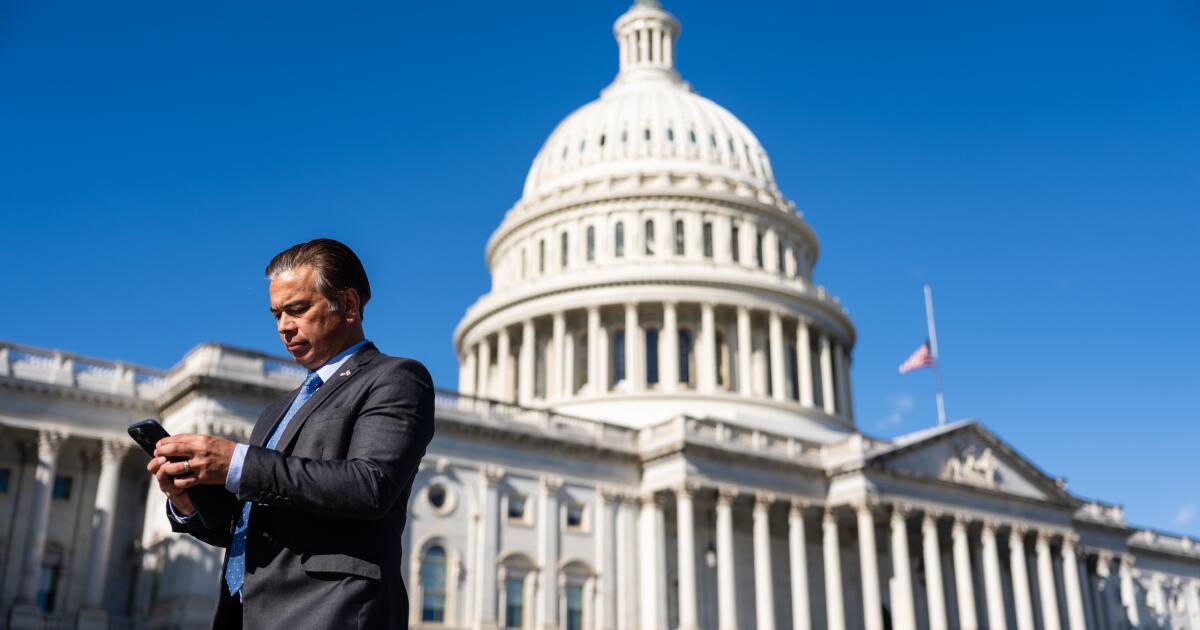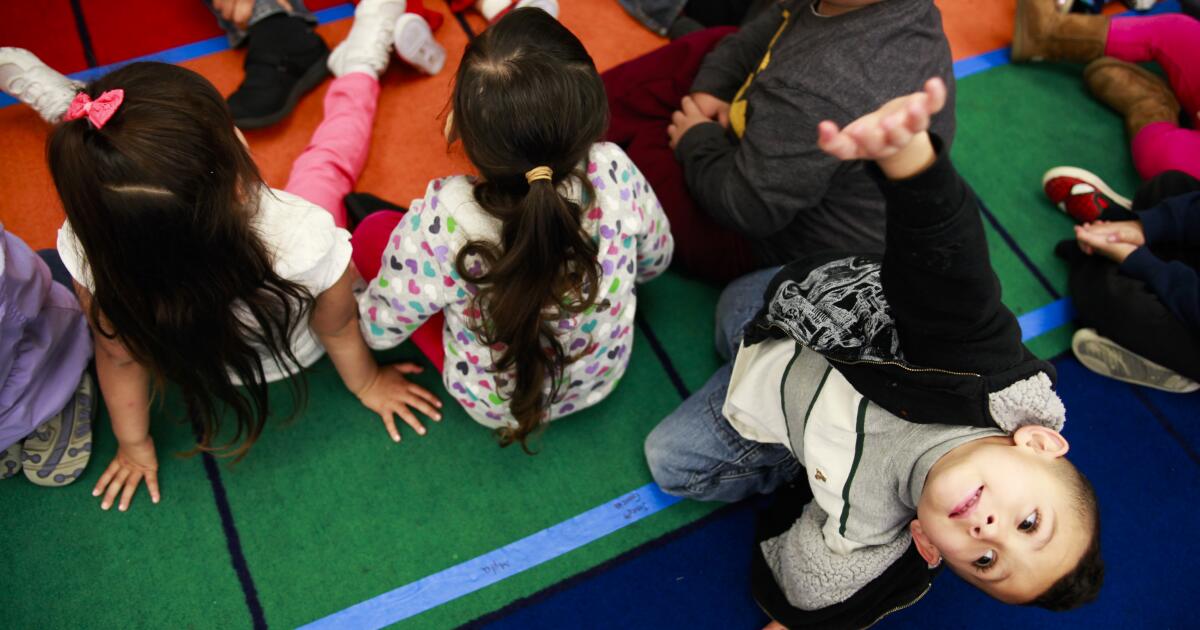SACRAMENTO — Gov. Gavin Newsom and other state Democratic leaders accused President Trump of unleashing a political vendetta after he announced plans to freeze roughly $10 billion in federal funding for child care and social services programs in California and four other Democrat-controlled states.
Trump justified the action in comments posted on his social media platform Truth Social, where he accused Newsom of widespread fraud. The governor’s office dismissed the accusation as “deranged.”
Trump’s announcement came amid a broader administration push to target Democratic-led states over alleged fraud in taxpayer-funded programs, following sweeping prosecutions in Minnesota. The U.S. Department of Health and Human Services confirmed the planned funding freeze, which was first reported by The New York Post.
California officials said they have received no formal notice and argued the president is using unsubstantiated claims to justify a move that could jeopardize child care and social services for low-income families.
How we got here
Trump posted on his social media site Truth Social on Tuesday that under Newsom, California is “more corrupt than Minnesota, if that’s possible???” In the post, Trump used a derogatory nickname for Newsom that has become popular with the governor’s critics, referring to him as “Newscum.”
“The Fraud Investigation of California has begun,” Trump wrote.
The president also retweeted a story by the New York Post that said his Department of Health and Human Services will freeze taxpayer funding from the Child Care Development Fund, the Temporary Assistance for Needy Families program, which is known as CalWORKS in California, and the Social Services Block Grant program. HHS said that the impacted states are California, Colorado, Illinois, Minnesota, and New York.
“For too long, Democrat-led states and Governors have been complicit in allowing massive amounts of fraud to occur under their watch,” said Andrew Nixon, a HHS spokesperson. “Under the Trump Administration, we are ensuring that federal taxpayer dollars are being used for legitimate purposes. We will ensure these states are following the law and protecting hard-earned taxpayer money.”
HHS announced last month that all 50 states will have to provide additional levels of verification and administrative data before they receive more funding from the Child Care and Development Fund following a series of fraud schemes at Minnesota day care centers run by Somali residents.
“The Trump Administration is using the moral guise of eliminating ‘fraud and abuse’ to undermine essential programs and punish families and children who depend on these services to survive, many of whom have no other options if this funding disappears,” Kristin McGuire, president of Young Invincibles, a young-adult nonprofit economic advocacy group, said in a statement. “This is yet another ideologically motivated attack on states that treats millions of families as pawns in a political game.”
California pushes back
Newsom’s office brushed off Trump’s post about fraud allegations, calling the president “a deranged, habitual liar whose relationship with reality ended years ago.” Newsom himself said he welcomes federal fraud investigations in the state, adding in an interview on MS NOW that aired Monday night: “Bring it on … if he has some unique insight and information, I look forward to partnering with him. I can’t stand fraud.”
However, Newsom said cutting off funding hurts hard-working families who rely on the assistance.
“You want to support families? You believe in families? Then you believe in supporting child care and child care workers in the workforce,” Newsom told MS NOW.
California has not been notified of any changes to federal child care or social services funding. H.D. Palmer, a spokesperson for the Department of Finance, said the only indication from Washington that California’s childcare funding could be in jeopardy was the vague 5 a.m. post Tuesday by the president on Truth Social.
“The president tosses these social media missives in the same way Mardi Gras revelers throw beads on Bourbon Street — with zero regard for accuracy or precision,” Palmer said.
In the current state budget, Palmer said California’s childcare spending is $7.3 billion, of which $2.2 billion is federal dollars. Newsom is set to unveil his budget proposal Friday for the upcoming fiscal year that begins July 1, which will mark the governor’s final spending plan before he terms out. Newsom has acknowledged that he is considering a 2028 bid for president, but has repeatedly brushed aside reporters’ questions about it, saying his focus remains on governing California.
Palmer said while details about the potential threat to federal childcare dollars remain unclear, what is known is that federal dollars are not like “a spigot that will be turned off by the end of the week.”
“There is no immediate cutoff that will happen,” Palmer said.
Since Trump took office, California has filed dozens of legal actions to block the president’s policy changes and funding cuts, and the state has prevailed in many of them.
What happened in Minnesota
Federal prosecutors say Minnesota has been hit by some of the largest fraud schemes involving state-run, federally funded programs in the country. Federal prosecutors estimate that as much as half of roughly $18 billion paid to 14 Minnesota programs since 2018 may be fraudulent, with providers accused of billing for services never delivered and diverting money for personal use.
The scale of the fraud has drawn national attention and fueled the Trump administration’s decision to freeze child care funds while demanding additional safeguards prior to doling out money, moves that critics say risk harming families who rely on the programs. Gov. Tim Walz has ordered a third-party audit and appointed a director of program integrity. Amid the fallout, Walz announced he will not seek a third term.
Outrage over the fraud reached a fever pitch in the White House after a video posted online by an influencer purported to expose extensive fraud at Somali-run child care centers in Minnesota. On Monday, that influencer, Nick Shirley, posted on the social media site X, “I ENDED TIM WALZ,” a claim that prompted calls from conservative activists to shift scrutiny to Newsom and California next.
Right-wing podcaster Benny Johnson posted on X that his team will be traveling to California next week to show “how criminal California fraud is robbing our nation blind.”
California officials have acknowledged fraud failures in the past, most notably at the Employment Development Department during the COVID-19 pandemic, when weakened safeguards led to billions of dollars in unemployment payments later deemed potentially fraudulent.
An independent state audit released last month found administrative vulnerabilities in some of California’s social services programs but stopped short of alleging widespread fraud or corruption. The California State Auditor added the Department of Social Services to its high-risk list because of persistent errors in calculating CalFresh benefits, which provides food assistance to those in need — a measure of payment accuracy rather than criminal activity — warning that federal law changes could eventually force the state to absorb billions of dollars in additional costs if those errors are not reduced.
What’s at stake in California
The Trump administration’s plans to freeze federal child care, welfare and social services funding would impact $7.3 billion in Temporary Assistance for Needy Families funding, $2.4 billion for child care subsidies and more than $800 million for social services programs in the five states.
The move was quickly criticized as politically motivated because the targeted states were all Democrat-led.
“Trump is now illegally freezing childcare and other funding for working families, but only in blue states,” state Sen. Scott Wiener (D-San Francisco) said in a statement. “He says it’s because of ‘fraud,’ but it has nothing to do with fraud and everything to do with politics. Florida had the largest Medicaid fraud in U.S. history yet isn’t on this list.”
Added California Assembly Speaker Robert Rivas: “It is unconscionable for Trump and Republicans to rip away billions of dollars that support child care and families in need, and this has nothing to do with fraud. California taxpayers pay for these programs — period — and Trump has no right to steal from our hard-working residents. We will continue to fight back.”
Times staff writer Daniel Miller contributed to this report.


